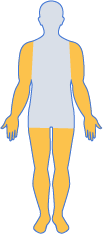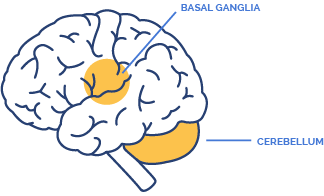Athetoid Cerebral Palsy
Athetoid Cerebral Palsy, also called dyskinetic Cerebral Palsy, is a less-common form of Cerebral Palsy. It accounts for roughly 1-in-10 cases of the condition. A combination of high muscle tone (hypertonia) and low muscle tone or “floppiness” (hypotonia) is the hallmark of athetoid Cerebral Palsy (ADCP).
- Difficulty controlling movement hands, arms, legs and feet
- Problems with walking and sitting
- Uncontrolled movements may be slow and writhing, as well as quick, jerky and small
- Movements may be random or repetitive
- Difficulty controlling facial movements may make it difficult to eat, drink, speak, suck and swallow
- Uncontrollable drooling
- Involuntary facial expressions, including grimaces
- Movements may increase in times of stress, excitement or emotional agitation
- Movements may decrease or stop during sleep, distraction or relaxation
- Muscle tone may change from day to day and even from hour to hour
- Difficulty reaching and grasping
- Uncontrollable squinting and eye movement
- Hearing loss
- Choreoathetoid Cerebral Palsy – This form of ADCP is characterized by uncontrollable movements primarily in the face and extremities (hands, feet, arms and legs).
- Dystonic Cerebral Palsy – This form of ADCP is characterized by slow and strong muscle movements that affect a large part of the body.

 ADCP results from damage to the brain, especially the parts of the brain that control muscle movement – specifically the basal ganglia and the cerebellum. Lesions on these areas of the brain may trigger symptoms of athetoid Cerebral Palsy.
ADCP results from damage to the brain, especially the parts of the brain that control muscle movement – specifically the basal ganglia and the cerebellum. Lesions on these areas of the brain may trigger symptoms of athetoid Cerebral Palsy.Lack of oxygen to the brain, particularly during and immediately after childbirth, is a common cause of ADCP. Kernicterus (bilirubin encephalopathy) has also been linked to ADCP.
The condition stems from injury and malformation of certain areas of the brain before the cerebrum has completely developed.
Treatments for athetoid CP may include:
 Speech therapy
Speech therapy Occupational therapy
Occupational therapy Physical therapy
Physical therapy Leg braces and other assistive devices
Leg braces and other assistive devices Medication to control or prevent involuntary muscle movement
Medication to control or prevent involuntary muscle movement Deep brain stimulation
Deep brain stimulationA patient’s prognosis depends on many factors that are unique to the individual. However, with treatment, many ADCP patients are able to gain some degree of mobility, speech and self-sufficiency.
- Pyramidal or spastic Cerebral Palsy
- Spastic diplegia/diparesis
- Spastic hemiplegia/hemiparesis
- Spastic quadriplegia/quadriparesis
- Extrapyramidal or non-spastic Cerebral Palsy
- Ataxic Cerebral Palsy
- Dyskinetic Cerebral Palsy
- Dystonic Cerebral Palsy
- Chorea
- Choreoathetoid
- Dystonia
- Ataxic Cerebral Palsy
- Mixed Cerebral Palsy
MyChild™ offers free case evaluations and answers to your questions about your child’s Athetoid CP. Fill out our online contact form now for confidential and caring assistance.







